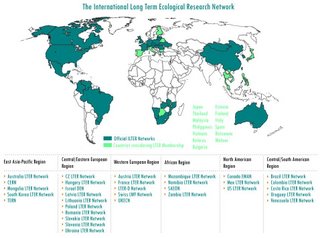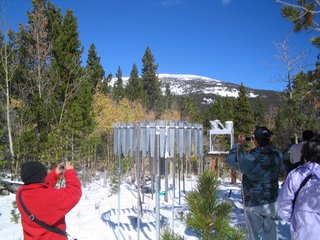

HOORC Senior Research Fellow Cornelis Vanderpost returned this week from the Sixth Long Term Ecological Research (LTER) All Scientists Meeting in the in Colorado, USA. Dr Vanderpost joined 600 other scientists who conduct long-term ecological research to visit the Niwot Ridge LTER site of the University of Colorado, where sophisticated atmospheric and ecological measurements are conducted (see photo).
The National Science Foundation's LTER program is at the forefront of scientific research in developing insights into how Earth's biosphere is changing over the long term. The LTER network consists of 26 LTER sites in the USA, located in major biomes, from the coldest desert to tropical coral reefs. The network also includes sites that address the range of human influence on ecosystems, from almost none in Antarctica to significant in urban Baltimore.
The International Long Term Ecological Research Network (ILTER) currently has 32 member countries (see map), each with a number of research sites. South Africa and Namibia are members and Botswana is in the process of becoming a member. Scientists from China, Taiwan, Austria, Slovakia, South Africa, Venezuela and Mexico were some of the ILTER members attending the US conference, which aimed to set out new directions for long-term social-ecological research for the next 25 years, emphasizing especially the need for more cross-disciplinary (social/ecological) and comparative cross-site research. ILTER’s vision is a world in which science helps prevent and solve environmental and socio-ecological problems. HOORC Research Fellow Susan Keitumetse attended the 2006 ILTER conference at the Gobabeb Research and Training Centre in Namibia in late August this year.
No comments:
Post a Comment